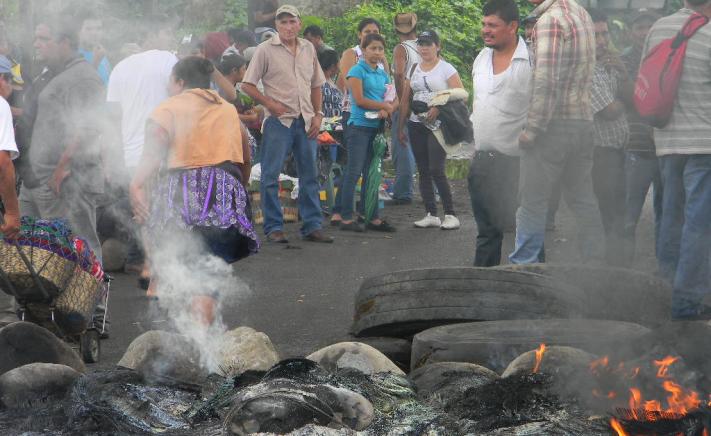
EspañolThe story was barely covered by Guatemalan media, nor did it gain international attention. On February 13, something took place which demands the attention of all those who those who claim to “fight for social justice.” A newborn child died because he couldn’t receive medical care. The reason? A protest blocking a road.
Prensa Libre reported that inhabitants of the region of Suchitepéquez had been staging demonstrations to demand highway repairs and the nationalization of electric power. The protesters — some of them drunk — blocked the road at kilometer marker 168, impeding an ambulance on its way to help a woman in labor.
The ambulance was finally able to reach the woman by taking side streets through the small town. However, “on the way to the hospital in Mazatenango, the protesters yet again blocked its way. They searched for an alternate route, but the newborn was in serious need of oxygen, and due to the delay, the child died in the ambulance,” according to the February 14 article.
When small activist groups, spread about a large area, feel the need to exercise their right to protest, they interrupt the safe passage of all other citizens.
This isn’t an isolated incident, even if fatalities don’t always occur. On February 23, various farmers unions, such as the Committee for Farming Development (CODECA) and the Coordination of Farming Organizations (CONIC), blocked all the principal motorways in Guatemala and brought the country to a virtual standstill.
The protesters’ complaints in this case were similar to those mentioned above. They generally displayed aggression toward anyone who tried to pass through the road. The Guatemalan government did nothing, maintaining a passive stance while its citizens were denied the right to travel freely.
The example is mirrored throughout Latin America. When small activist groups, spread about a large geographical area, feel the need to exercise their right to protest, they interrupt the safe passage of all other citizens in both rural and urban zones. The causes vary, ranging from opposition to mining or hydroelectric plants, poverty, complaints about public works projects, or simply to secure political objectives.
The government says and does nothing for fear of being labelled repressive. It would rather the right of millions of citizens to freely circulate around the country be violated than confront the tiny activist groups that cause chaos and even fatalities.
What’s worse is that some international groups from developed countries encourage and finance these illegal protests, wrongly believing that they’re supporting noble causes, such as the environment, the rights of minorities, or the interests of the poor.
The mediocrity is perpetrated by governments with double standards: demagogues who want to curry favor with everybody.
However, these methods only alienate serious advocates for change, contribute to the destabilization of countries, and hold back the economic development that is in the best interest of the groups they supposedly defend. In a recent debate in the Netherlands Parliament, legislators raised concerns about their compatriots who are promoting disorder in Guatemala from afar.
On the other hand, the phenomenon of minority protests infringing the rights of the majority is simply an expression of the political weakness that we all tolerate. This mediocrity is perpetrated by governments with double standards: demagogues who want to curry favor with everybody, but prioritize the most aggressive groups and international agencies.
They’re governments who continuously talk about democracy, but whose leaders don’t shy away from appearing arm in arm with Raúl Castro, or justifying the human-rights abuses perpetrated by Venezuela’s Nicolás Maduro. They defend the rights of some and not others, condemn military coups of the past but hail as heroes those who perpetrated equal abuses when they took up arms as guerrilla.
Latin America today, for the most part, is governed by weak politicians who lack republican convictions. They know how to limp to the end of their term in office, but along the way undermine the very institutions that allowed them to come to power in the first place.
As the Guatemalan tragedy detailed above shows, this situation takes lives. It will only change when citizens become aware of the risks that come with this widespread demagogy, and stop supporting those who want to be charitable — with the money of others.
Translated by Thalia C. Siqueiros. Edited by Laurie Blair.
 Versión Español
Versión Español












